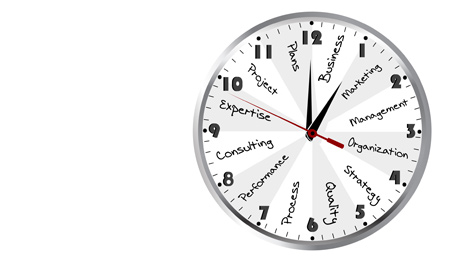Out of Time
Crazed. Overwhelmed. Insanely busy. Whichever word you choose, it’s hard to escape the feeling that our lives are out of control. It’s no surprise that an increasing number of books are popping up on the Amazon shelves addressing the epidemic of our time – the fact that we have no time. I hear it in almost every coaching conversation, “There’s barely time to breathe here”. “How can I focus on being strategic when I have hundreds of emails to get through and managers constantly knocking on my door for assistance with the crisis of the day?”. “I’m in back to back meetings all day, not sure when I’m supposed to get the work done”.
We can blame the unintended consequences of smartphones, the time-sucking and ironically inefficient nature of email, or the long-term impact of the prior recession which demands more output from fewer people, but the result is the same – we’ve got a problem. We can’t look to our home lives to offer a respite from the chaos, because there too – we have a problem. How many lessons did you shuttle little Johnny to this week? How many meals did you cobble together in the nick of time — the new, “we’re eating later all the time” time?
Addressing the problem requires more than a little tweaking. We need a new mindset, new capabilities and structures, and new practices.
Mindset
We can start by valuing effectiveness and optimal mental condition instead of valuing checking off the “to dos” on our “to do” list. When we focus on getting ourselves to feel optimal we actually expand our capacity to operate.
We need a “stop the madness” mindset where we bring focus to the problem, similar to the focus of attacking that drop in revenue. Go ahead, ask your team to identify top time-wasters and to make a list of what your division can stop doing. Put a halt to the always adding, never subtracting way of business.
Bring a sense of urgency. Understand that the problem is making you and your team sick – literally. The increase in the level of stress and stress-related disorders is growing at a staggering rate. In a recent conversation with a high-performing client in a significant and visible role, he shared that although he liked his work he would need to make a transition soon. It was a choice of living or dying and he was choosing to live.
New Capabilities and Structures
To stem the tide of overwhelm, we must significantly improve our skill on several fronts:
- Move from basic prioritization skills to ruthless prioritization. Keep asking the question, “What’s the most important thing we/I need to be doing here?” or “What do I really value in my life?”
- Move from passive ownership of your calendar to proactive ownership. Block out your time first. Learn to challenge those who steal your time. As managers and leaders who impact the calendars of countless others (who feel helpless on this front), challenge your organization to the “highest and best use” test. What is the highest and best use of each team member and where will their presence truly impact the top priority items?
- Increase your skill at having conversations about priorities.
New Practices
As I walked through the halls of one of our country’s top business schools recently, I saw a sign that read “Mindfulness Meditation Training – 4pm”. I wasn’t sure whether to smile at the fact that these soon to be MBAs would enter the workforce already armed with an important tool or to frown at the realization that they actually needed such practices for coping in our crazy busy world. Either way, it is clear that practices like meditation, deep breathing, regular exercise and intentional, scheduled breaks are key to functioning optimally and with less stress. Ignore them at your own peril.
With focus and intent we can bring a bit more calm into our lives, and it’s not a moment too soon. New brain research shows that our current way of working is actually changing our brains, making the ability to focus harder and harder. If problem-solving and creative thinking (skills which require deep focus) are keys to success, it’s high time we give the problem of overwhelm a serious look.
– Nina Bowman


